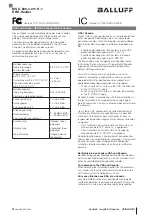
Ver1.0
,
07/01/2005
,~
1
~
SG-3011 Isolated Thermocouple Input Module
User’s Manual
Introduction
The SG-3011 is a thermocouple input signal conditioner. SG-3011 uses
microprocessor-controlled high-resolution 24-bit dual-slope,integrating A/D
converter to acquire thermocouple signal and cold junction compensation input.
Temperature measurement is handled by thermocouple linearization and cold
junction compensation function. The supported thermocouple types are J, K,
T, E, R, S, B, N, C, L, M,L2(DIN 43710).
The SG-3011 features optical isolation technique providing 3000Vdc isolation.
The power supply that drives the module`s input and output circuitry is
internally isolated,enabling SG-3011 to offer true channel - to - channel
isolation.
It’s easy to mount the SG-3011 on a standard DIN rail and can operate in
environment with wide temperature range.
Specifications
Thermocouple Type
:
Thermocouple
Type
Temperature
Range
℃
Type J
-40 ~ +760
Type K
0 ~ +1000
Type T
-100 ~ +400
Type E
0 ~ +1000
Type R
+500 ~ +1750
Type S
+500 ~ +1750
Type B
+500 ~ +1800
Type N
-100 ~ +1300
Type C
0 ~ +2000
Type L
-200 ~ +800
Type M
-200 ~ +100
Type L2 (DIN 43710)
-200 ~ +900
Voltage Output:
Unipolar: 0~10V
Output impedance: <50
Ω
Current Output:
Current: 0~20mA
Current load resistor:0~450
Ω
(Source)
General
Three-way isolation: 1000 Vdc
Overload protection: 240 Vrms
CJC offset adjustable
Open thermocouple detection
Accuracy: ±0.2% of full range
Operating temperature range:-25
°
C
~
75
°
C
Storage temperature range:-30
°
C
~
85
°
C
Supply Voltage
Input range: 10
~
30 Vdc
Configuration
The terminal wiring for the SG-3011 is shown in Figure A. The SG-3011 uses a power input
range of 10~30Vdc.
Figures D and E show the switch positions used to configure the input and output range.
The I/O configuration switches are located inside the module and can be accessed by
removing the DIN-rail bracket covers by sliding them in the direction shown in Figure B.






















